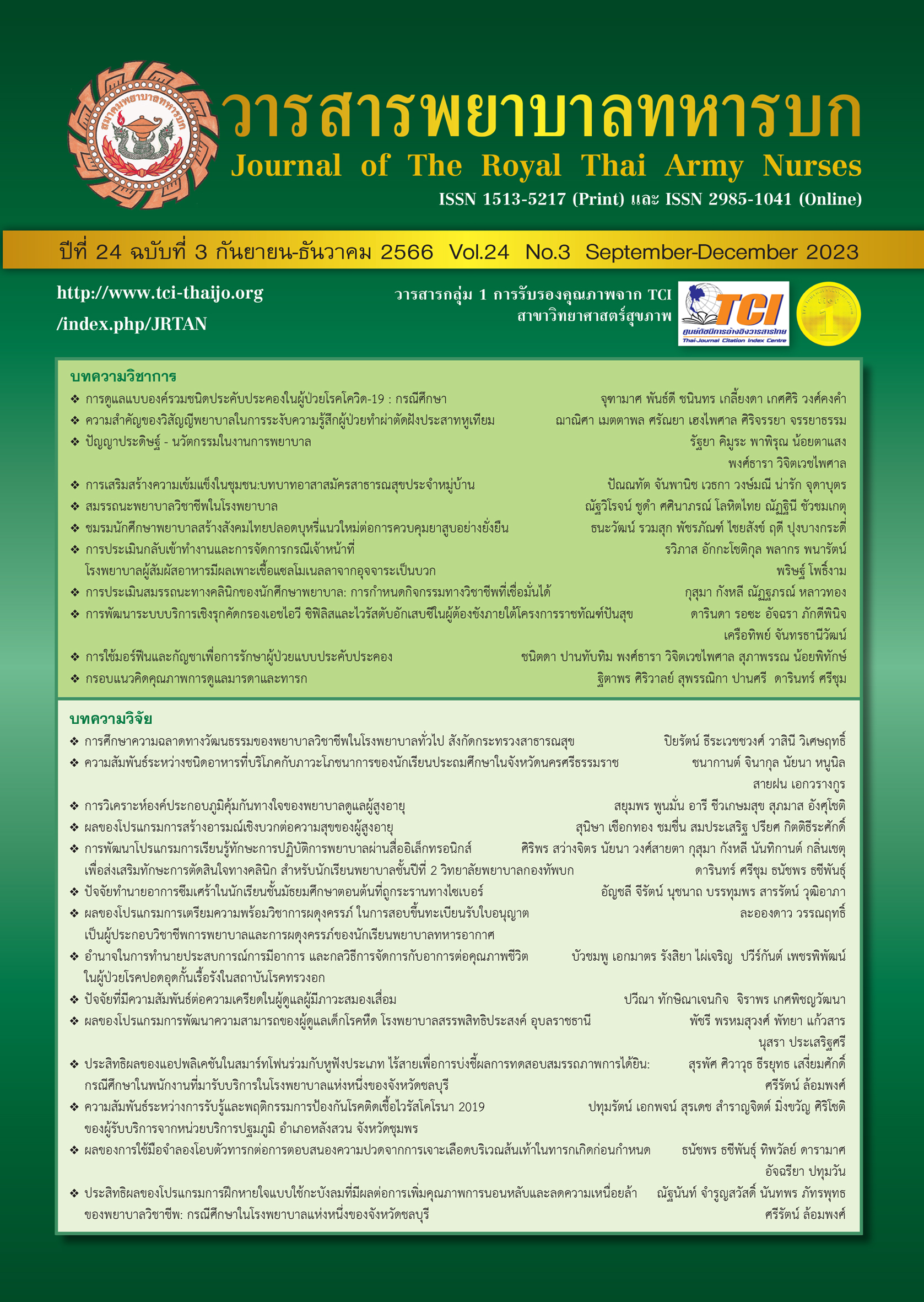Clinical Competency Assessment for Nursing Students: Identifying Entrustable Professional Activities
Keywords:
Clinical Competency Assessment, Miller's Pyramid Framework, Entrustable Professional Activities (EPAs)Abstract
Competency-based assessment (CBA) aims assess the clinical competency of learners in nursing practices that demonstrates the ability to apply knowledge, skills, attitudes, and professional characteristics according to nursing standards. Clinical competency assessment based on the Miller’s Pyramid Framework using Entrustable Professional Activities (EPAs) as an innovation assessment framework used in the competency-based nursing education assessment at “the Does level” and “the Identity level”. Clinical competency assessment is workplace-based assessment (WPBA) by direct observation of procedural skills (DOPS). Determining the EPAs to translate the nursing competencies into proficiency levels of the milestones by which nursing students can apply their knowledge, skills, attitudes, and professional behavior in nursing practices by themselves, under direct and proactive supervision, or without supervision and provide supervision to junior trainees.Clinical Competency Assessment for Nursing Students using Entrustable Professional Activities to guide clinical competency assessment for nursing students maximizes patient benefit.
Downloads
References
Kooariyakul A. Clinical learning assessment of nursing students. Journal of Boromarajonani College of Nursing Bangkok. 2017; 33(2): 179-87. (in Thai)
Klaharn R, Chaiso P. The Development of a Competency Assessment System for Nursing Students’ Practicum. Journal of The Royal Thai Army Nurses. 2013; 14(2): 48-58. (in Thai)
Ten Cate O. Nuts and Bolts of Entrustable Professional Activities. Journal of graduate medical education. 2013; 5(1): 157-8.
Dhaliwal U, Gupta P, Singh T. Entrustable Professional Activities: Teaching and Assessing Clinical Competence. Indian Pediatrics. 2015; 52(7): 591–7.
Tangdhanakanond K. Performance assessment. 3rdEd. Bangkok: Chulalongkorn University Press; 2020. (in Thai)
Croft H, Gilligan C, Rasiah R, Levett-Jones T, Schneider J. Current Trends and Opportunities for Competency Assessment in Pharmacy Education. Pharmacy. 2019.
Miller GE. The assessment of clinical skills/ competence/performance. Academic Medicine. 1990; 65(9): S63-7.
Cruess RL, Cruess SR, Steinert Y. Amending Miller’s pyramid to include professional identity formation. Academic Medicine. 2016; 91(2): 180-5.
Ten Cate O, Carraccio C, Damodaran A, Gofton W, Hamstra SJ, Hart DE, et al. Entrustment Decision Making: Extending Miller’s Pyramid. Academic Medicine. 2021; 96(2): 199-204.
Yudkowsky R, Park YS, Downing SM. (Eds.). Assessment in health professions education. 2nd Ed. New York: Routledge; 2020. 11. Mehay R. The essential handbook for GP training and education. CRC Press; 2021.
Ten Cate O, Chen HC, Hoff RG, Peters H, Bok H, van der Schaaf M. Curriculum development for the workplace using Entrustable Professional Activities (EPAs): AMEE Guide No. 99. Medical Teacher. 2015; 37(11): 983-1002.
Kanglee K, Lawthong N, Orathai P. Clinical Competency Assessment Model for Nursing Students Based on Miller’s Pyramid Framework Using Entrustable Professional Activities. Journal of The Royal Thai Army Nurses. 2022; 23(2): 468-82. (in Thai)
Ten Cate O, Pool IA. The viability of interprofessional entrustable professional activities. Advances in Health Sciences Education. 2020; 25(5): 1255-62.
Chen HC, McNamara M, Teherani A, Ten Cate O, O’Sullivan P. Developing entrustable professional activities for entry into clerkship. Academic Medicine. 2016; 91(2): 247-55.
Chen HC, van den Broek WES, Ten Cate O. The Case for Use of Entrustable Professional Activities in Undergraduate Medical Education. Academic Medicine. 2015; 90(4): 431-6.
Downloads
Published
How to Cite
Issue
Section
License
Copyright (c) 2023 Journal of The Royal Thai Army Nurses

This work is licensed under a Creative Commons Attribution-NonCommercial-NoDerivatives 4.0 International License.
บทความหรือข้อคิดเห็นใดใดที่ปรากฏในวารสารพยาบาลทหารบกเป็นวรรณกรรมของผู้เขียน ซึ่งบรรณาธิการหรือสมาคมพยาบาลทหารบก ไม่จำเป็นต้องเห็นด้วย
บทความที่ได้รับการตีพิมพ์เป็นลิขสิทธิ์ของวารสารพยาบาลทหารบก
The ideas and opinions expressed in the Journal of The Royal Thai Army Nurses are those of the authors and not necessarily those
of the editor or Royal Thai Army Nurses Association.






